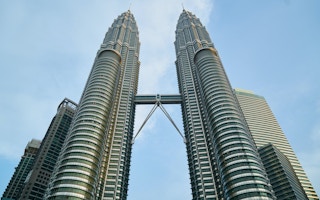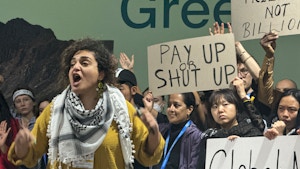Malaysian oil and gas giant Petronas has announced that it is becoming a signatory to the Oil and Gas Methane Partnership 2.0 (OGMP 2.0), a multi-stakeholder initiative aimed at improving the accuracy and transparency of methane emissions reporting.
To continue reading, subscribe to Eco‑Business.
There's something for everyone. We offer a range of subscription plans.
- Access our stories and receive our Insights Weekly newsletter with the free EB Member plan.
- Unlock unlimited access to our content and archive with EB Circle.
- Publish your content with EB Premium.
The company’s chief sustainability officer, Charlotte Wolff-Bye, announced the news during a panel discussion on methane reduction at the Malaysia Pavilion on 8 November at the COP27 climate talks in Sharm El-Sheikh, Egypt. The panel was co-organised by non-profit Environmental Defense Fund (EDF) and Malaysia’s Ministry of Environment and Water.
OGMP 2.0, launched by the United Nations Environment Programme (UNEP) and the Climate and Clean Air Coaliition, is a measurement based reporting framework for the oil and gas industry. Over 80 companies have joined the initiative, which is part of global efforts to curtail methane emissions.
Methane is the second most common anthropogenic greenhouse gas after carbon dioxide, and 25 per cent of global warming today is caused by methane released from human actions. In 2021, the global oil and gas industry wasted $19 billion of natural gas due to methane emissions.
“[Joining OGMP 2.0] commits us to clear management of methane emissions and transparency in our reporting. We believe this will be good for our competitiveness. Over the next five years we will continue to promote methane management across the oil and gas sector in Southeast Asia,” said Wolff-Bye.
The company recently announced its Net Zero Carbon Emissions by 2050 pathway, to help steer the company towards carbon neutrality by 2050, a goal which was announced in November 2020.
Petronas’s commitment is an “aspiration” and is not aligned with the Paris Agreement goal of capping global warming at 1.5°C above pre-industrial levels.
“We have set a target to reduce methane across our international operations by 50 per cent by 2025, with a further increase to 70 per cent by 2030. We have also set a target to reduce methane emissions by 50 per cent across Malaysia’s natural gas value chain by 2030,” said Wolff Bye.
She added: “In 2021, Petronas reduced methane emissions from 9.3 million tonnes to 6.5 million tonnes. That’s a strong result in a single year.”
Methane is a potent greenhouse gas that has a warming potential 80 times greater than carbon dioxide.
“Methane in the atmosphere is causing half a degree centigrade of the 1.1 or 1.2 degrees centigrade of warming that we’re suffering from already, “ said Rick Duke, the US deputy special envoy for climate, who was another panelist at the event.
“There is no faster way to control the pace of climate change over the next 30 years than to cut methane, and there’s no faster way to cut methane than to cut it from the oil and gas sector,” he said.
Unnecessary venting, burning or leaks of natural gas are the main sources of methane emissions in the oil and gas industry. Fixing these leaks from oil and gas infrastructure is a relatively quick and cost effective way to slash these emissions.
“Methane emissions from the oil and gas sector back in 2020 was about 70 billion tonnes and that’s the equivalent of all the energy sector emissions of the European Union. So it is significant and must be addressed,” said Wolff-Bye.
Countries around the world are responding to the methane issue. One example is the Global Methane Pledge, which was launched at COP26 in 2021. Over 100 countries, including Malaysia, committed to collectively reduce methane emissions by at least 30 per cent below 2020 levels by 2030.
In Malaysia, according to the nation’s third biennial report to the United Nations, the two largest source of methane emissions are the oil and gas industry and the palm oil industry.
Navigating the just transition
The transition from fossil fuel to cleaner energy sources requires massive retraining and investments to mitigate the potential negative effects such as job losses.
Wolff-Bye said that Petronas has pledged to invest one-fifth of its capital expenditure over the next four years on decarbonisation, and is taking measures to ensure its workforce can adapt to a changing sector.
“We have over 40,000 workers at Petronas. It’s very important for us to reskill those subsurface geologists for instance, to not just extract but also to sequester and put gas in. No energy company can go and hire a whole new workforce. These people do not exist. At the same time, we need people who work in academia to make sure we have the skills for the future.”
“Digitalisation is absolutely critical and will become the new language in any industry,” she said.














